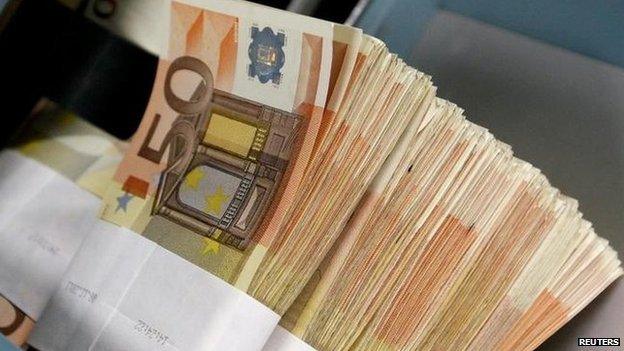Peston: Will cheap euros save the eurozone?
- Published
- comments

So the European Central Bank has embarked on cash creation through quantitative easing some six years after the Bank of England and the US Federal Reserve embarked on what was then regarded as an unconventional monetary policy.
And the size of the programme, relative to eurozone GDP or output, is not a million miles from what those other central banks did. In other words, it isn't trivial.
If the ECB buys all it might, it would create well over a trillion euros of new money, for the purchase of government bonds - which is the new element - and the private-sector bonds it had already committed to purchase.
Probably the best way of seeing this is as a significant increase in the supply of money, so that money will become cheaper. And if the euro becomes cheaper, that means it falls in value relative to other currencies and interest rates will fall.
In fact, in the past couple of hours, we've already seen a weakening of the euro and a drop in the implicit interest rate paid by eurozone governments.
Knock-on effects
A fall in the euro should help eurozone exporters to sell more abroad.
And a fall in interest rates may encourage households, businesses and governments to borrow a bit more, and spend and invest a bit more.
So just maybe eurozone QE will restore a bit of momentum to the eurozone's flatlining economy and just maybe it will nudge eurozone prices upward a bit and away from the danger zone of intractable deflation (in deflationary conditions, households and businesses are reluctant to spend, because they know they can always buy cheaper tomorrow - and that crushes growth).
But what is good for the eurozone has mixed benefits for other countries, like the UK.
On the one hand, since the eurozone is the UK's biggest trading partner, if it recovers a bit that should be good for our exporters.
Not enough
But there is also an element of beggar-my-neighbour in what the ECB is doing - in that a falling euro means the sterling price of goods and services made in the eurozone will fall in Britain.
And if you happen to be worried that good low inflation in the UK could turn into bad growth-stifling deflation, then what the ECB has done increases that risk.
I asked the chancellor about this today here in Davos. And he broadly passed the buck to the Bank of England - in that it's the Bank's job to deal with inflation or deflation, as and when they are dangerously far from the 2% target.
But he did make the point that money creation will not be enough to fix the eurozone - that, like the UK, it will have to embark on structural economic reform if it wants to leave hospital and be back doing press-ups in the park.
And for the avoidance of doubt, this is not smug, British chauvinism on display, the hubris of a chancellor whose economy is expanding almost three times as fast as the eurozone's - because more or less the same thing was said to me by the Italian finance minister, Pier Carlo Padoan.
Pyrrhic victory?
One more thing.
The Germans had their victory over the ECB's president Mario Draghi in respect of the design of the scheme - such that the risk of losses on 80% of the public-sector bonds being bought will sit with national central banks rather than the ECB.
This means that in theory German taxpayers are sheltered from notional exposure to the stretched finances of the Italian or Spanish governments, for example.
But as I explained the other day, this victory may be pyrrhic - in that it may limit the effectiveness of the scheme, to the detriment of the entire eurozone.
How so? Well if investors perceived that the central bank of Italy, for example, were taking on unaffordable risks when buying Italian government bonds, at that point the price of those bonds would fall, the implicit interest rate paid by the Italian government would rise, and the whole point of QE would be blown up.